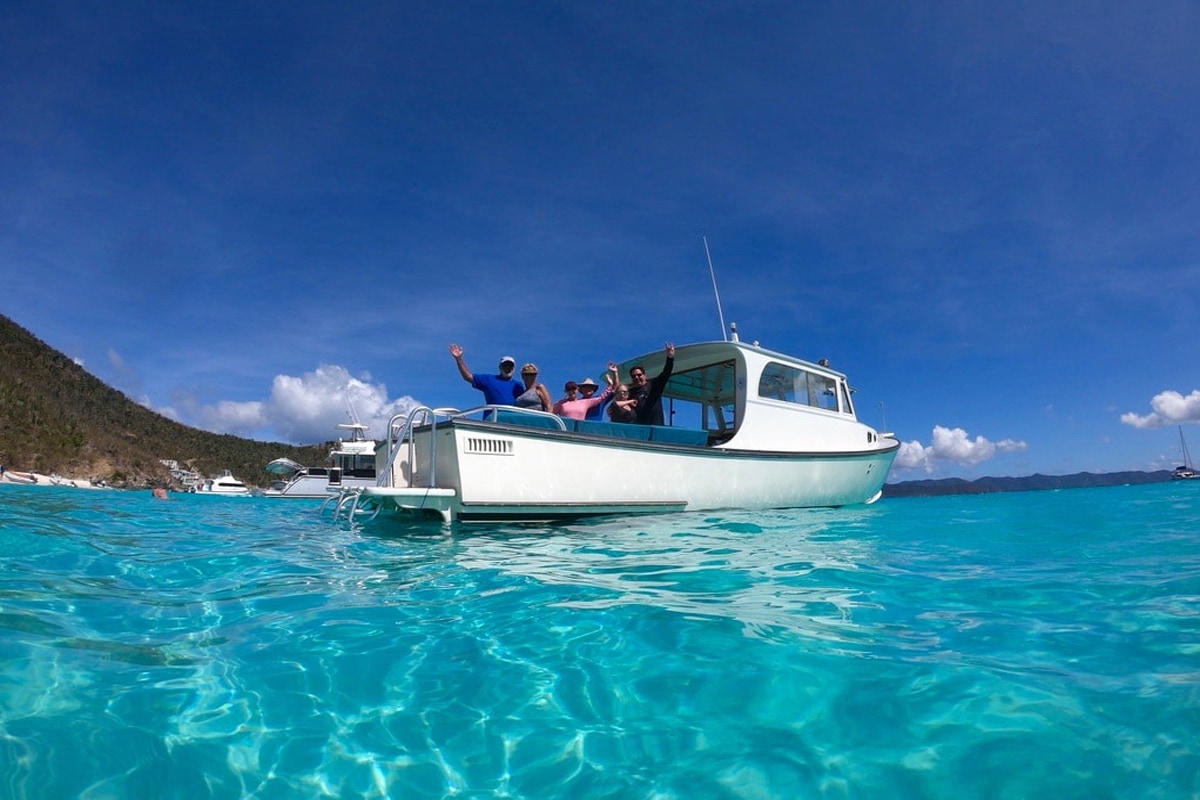USVI Passenger for Hire Regulations.
Start learning what you can do and not do in regards to chartering with paying passengers in the US Virgin Islands.
U.S. Flagged Vessels can:
(1) Operate as a Recreational vessel (no paying passengers), limited to the number of passengers in accordance with the manufacturer;
(2) Operate as a chartered vessel with no crew provided, limited to 12 passengers with a written (bareboat) charter contract meeting recreational vessel requirements; or
(3) Carry up to 6 passengers for hire as an Uninspected Passenger Vessel (UPV) if less than l00 Gross Registered Tons (GRT); vessels greater than 100 GRT can carry up to 12 passengers.
The vessel must be U.S.-built, if not it must have a MARAD waiver.
*Note: If the vessel is over 5 net tons, it requires a Certificate of Documentation (COD), endorsed for Coastwise service.
Recreational Vessel: Means a vessel;
(A) Being manufactured or operated primarily for pleasure; or
(B) Leased, rented, or chartered to another for the latter’s pleasure.
Charter (bareboat) Operation: A valid (bareboat) charter is an agreement where the charterer has use of the vessel for a period of time and is considered the owner. A charterer takes on the legal obligations, is responsible for the crew, passengers carried, and others. Elements of a valid bareboat charter may include:
(1) The charterer must have the option of selecting & paying crew, although the owner may require general levels of proficiency for the crew that is retained based on federal statutes;
(2) The master/crew are paid by the charterer;
(3) All food, fuel, and stores are provided by the charterer;
(4) Insurance is obtained by the charterer;
(5) The charterer is responsible for the safe navigation of the vessel;
(6) A platform for events that do not involve consideration, even when moored at the pier; and
(7) The vessel is surveyed upon return to the owner.
Passenger For Hire & Charter Vessel Operations Common Bareboat Charter Vessel Errors
(1) A chartered vessel may NOT carry more than 12 passengers without a Certificate of Inspection (COI).
(2) A chartered vessel may NOT carry more than 12 passengers while moored. A charter vessel is considered to be carrying “passengers” whether moored or underway. This includes a Boat Bed and Breakfast.
(3) The owner of the vessel may NOT be the vessel master or part of the crew. The vessel owner is not allowed on board during a charter.
(4) A bareboat charter contract may not provide or dictate a crew. The charterer must be able to select a crew and have the ability to discharge the crew.
(5) The charterer is not considered a passenger, and there can only be one charterer, even though the vessel may be chartered by several individuals. In this case, one person would be considered the charterer and the rest would be counted as passengers.
(6) Both U.S. flag and foreign vessels may be chartered. However, a foreign-flagged vessel cannot carry passengers for hire between U.S. ports and must be chartered and /or operate as a recreational vessel (per coastwise trade laws enforced by CBP).
Virgin Islands Regulations for Uninspected Vessels (UPV) Carrying Up To 12 Passengers For Hire – Blue & Yellow Code Vessels operating in the U.S. Virgin Islands have been restricted to carrying no more than 6 passengers as a UPV, or otherwise seek Blue or Yellow Code certification to carry more than that.
Section 319 of the Howard Coble and Coast Guard and Maritime Transportation Act of 2014, allows vessels operating to or from a port in the U.S. Virgin Islands to carry up to 12 passengers if they comply with the Blue or Yellow code.
Compliant vessels may carry up to 12 passengers within the USVI and on international voyages to the BVI, but not to another U.S. port outside of the U.S. Virgin Islands and have no bearing or application in Puerto Rico.
• Vessels wishing to carry between 7 and 12 passengers as an uninspected passenger vessel must be in compliance with either the Blue or Yellow Code (as appropriate);
• To verify compliance with the Code, the vessel must be examined by a Certified Authority Listed within the appropriate Blue or Yellow Code; and
• The operator must maintain a valid Small Commercial Vessel Certificate issued by a Certifying Authority under the Code, and keep it aboard;
• Compliant vessels will be restricted to no more than 3 miles from land and no more than 20 miles from a harbor of safe refuge.
- Boat Bed and Breakfast Operations must meet the same requirements for commercial vessels.

